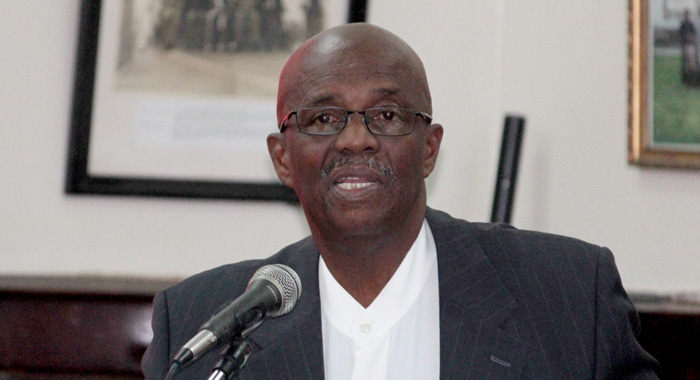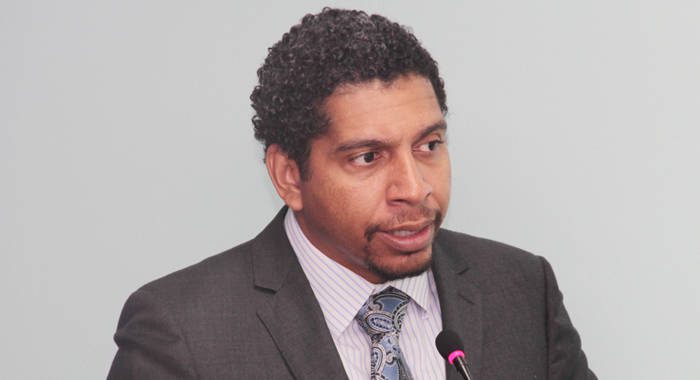Government senator Camillo Gonsalves has countered the cross-country comparison of rape statistics used by the opposition over the past few weeks to suggest that St. Vincent and the Grenadines is among the world’s leading nations as regards sex crimes against women and children.
The main opposition New Democratic Party has quoted figures from the United Nations Office on Drugs and Crime (UNODC) and the Royal St. Vincent and the Grenadines Police Force and contrasted them to other nations’ statistics to arrive at their conclusions.
Speaking in Parliament last week during the debate of Domestic Violence Bill, Leader of the Opposition Arnhim Eustace said that in 2007 there was collective shame and outrage when a UN report ranked SVG third in the world for rape.
He said that since then there has been a statement from the Inter-American Commission on Human Rights, which said SVG was number one in terms of rape for the period 2000 to 2010, with 802 reported cases.
“I don’t think that anybody in this House of Assembly is happy with the status of women in relation to a number of these crimes,” Eustace said.
Between 2004 and 2011, SVG averaged second among 102 countries in the world in terms of rape, Eustace said, citing UN figures.
He said that local police have said there were 187 reported cases of rape, sex with minors and buggery in 2013, and in 2014 the number was 228 cases.
“Taken with the UN data, it indicates a continuation of the 2004 to 2009 trend with 170.9 [cases] per 100,000 in 2013 and 208 in 2014,” Eustace said.
“Mr. Speaker, by any measure, a small island country like ours, ranked with 102 countries, finds itself at the top of the ladder, top in the sense of being worst,” Eustace told Parliament.
He said that in terms of police recorded cases of rape in 126 countries, SVG averaged fourth for the period 2004 to 2011.
During that same period, SVG averaged seventh among 92 countries in terms of police recorded instances of sexual offences against children.

In his contribution to the debate, Gonsalves told Parliament that he wanted to address some of the statistical “slight of hand” that had been taking place.
He said the UN website can analyse the data often quoted by the opposition in various ways — including region, year, gender, age — and print the data for countries that the user selects.
Gonsalves, a former ambassador to the United Nations, told lawmakers that each data set includes the caveat that “when using the figures, any cross-national comparisons should be conducted with caution because of the differences that exist between the legal definition of offences in countries and the different methods of offence counting and recording”.
“It means that what we called rape in St. Vincent and the Grenadines might not be called rape in Saudi Arabia. And when Saudi Arabia reports its rape statistics, where a man cannot rate his wife, and where, in Gulf countries, it’s a known fact that migrant workers are raped regularly without any penalty, these things do not appear in UN statistics,” said Gonsalves, who is also Minister of Foreign Affairs.
“It doesn’t mean that it is not happening, but it goes to the manner in which crimes are defined and the manners in which crimes are reported.”
Gonsalves said that the day after the bill is passed the reportage of sex crimes in SVG can increase, not because of any increase in illegal activity, but because there is a broader definition of the offence and there is a reporting obligation imposed on members of society and the police.
“And it will be expected, it will be strange, in fact, it might be a measure of the failure of legislation if there is not an uptick in the reporting, simply by virtue of the changing definitions and the changing requirements that we are placing on the police and on members of society.”
The senator said that one couldn’t talk about who is number one in the world among 102 countries because there is 193, countries in the world.
He said that while there is talk about SVG being number one in the world and the Caribbean, no one mentioned that Dominica, Antigua and St. Lucia have never reported to the UNODC.
“I am not saying that their data is worst than ours. I am saying that the data set is flawed. I’m telling you that in nine years that I have on this slate here, only three Caribbean countries reported in every one of the nine years, and that is from 2004 to 2012: Trinidad and Tobago, St. Vincent and the Grenadines and Barbados,” Gonsalves said.
“Some report when they didn’t have a bad year, statistically and leave out the next year. Or maybe there is an administrative failing. But, to rely on this data, without deeper analysis is tantamount to fraud,” he said.
He noted that St. Kitts and Nevis reported nothing for 2003 to 2008 and then reported for 2009, 2010, and 2011, and didn’t report for 2012 and 2013, while SVG reported for every year.
“And you can always pick a year out and say in that year St. Vincent and the Grenadines had the worst performance. And it is true, we have had some bad and inexcusable performances and I am not excusing them. I am talking about lies, damned lies, and statistics,” Gonsalves said.







Well said Camilo. We are comparing apples and oranges with stats like this because of their cultural, social, political, and legal underpinnings. SVG may well have among the highest “rape” numbers in the world but these statistics are too weak to prove this.
Also, there is no reason to suspect that our rape numbers are significantly different than those in countries like Grenada, Guyana, or Jamaica.
Our problem is not rape as such but rather what happens when rape is reported to family, friends, police, etc. Too often nothing happens. That is the real crime here!
Too bad the NDP is using this issue only for political gain which serves to re-victimize women and children affected by rape.
Hi! David, I am all for publicizing the rape statistics even if there is only one a year. The police and government try and keep the figures and locations under wraps, we as a voice of a section of the public must keep talking about it otherwise it will continue and the numbers of cases will grow. Of course it becomes political, because there has been an explosion of sex crimes under the ULP regime, and explosion ever since a number of women made allegations against PM Gonsalves.
It’s all very well Camillo and the Jomo making statements to try and disprove the figures; they should spend as much energy in condemning rape, not bickering about the numbers. They should try telling women that they were not raped; they imagined it, just like the policewoman and the Canadian lawyer imagined being raped and sexually assaulted by Ralph Gonsalves.
One case of a raped child or woman is a million cases too many. But also we must not forget that little boys are being raped here by nasty men, the trauma for them must be even be worse as it’s an abominable and un-natural act against a child that just doesn’t understand. But all in all every act of rape is disgusting and intolerable and we must shout out if we are going to have any effect on it.
Remember there are people here who say such things as “she asked for it by the way she dressed’. There are also policemen who refuse to take a statement from raped persons; there are even policemen that have been accused of rape. Perhaps worst of all because of the influence on the public, the Prime Minister of our nation state has been accused of rape and sexual assault, by fairly recent accusations and resulting charges and some accusations going back twenty years that the DPP simply laughed at.
So I reiterate lets hear Jomo and Camillo tell us, tell the world that rape and sexual assault is totally unacceptable in SVG [or anywhere else], and lets see these two men demand that PM Gonsalves stand trial for his accused crimes and let the courts decide if he is guilty or not guilty.
Many rapes in SVG are hidden by the women, not reported because the police mock women in SVG when they go to the police station.
So its much worse, even Camillo’s father was accused of rape a… There are even complaints by women about his father going back many years,
Stastical analysis of the highest order – manipulate data to fit your hypothesis. Find an excuse for any of the data that does not fit. Run those numbers again!. Or maybe just creative fuzzy math?